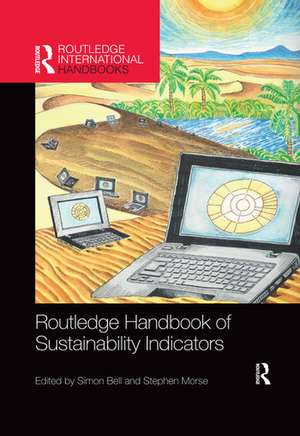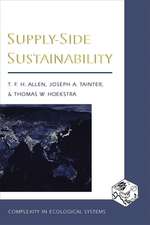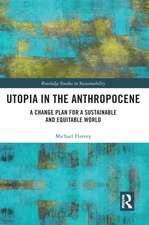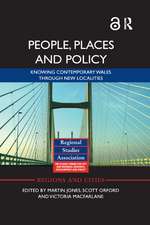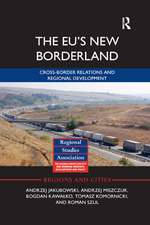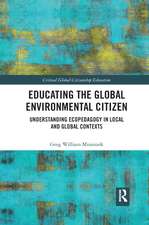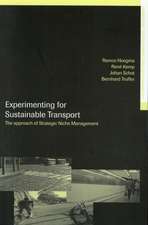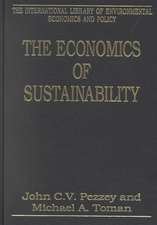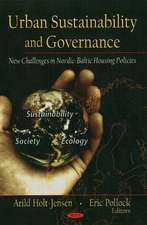Routledge Handbook of Sustainability Indicators: Routledge Environment and Sustainability Handbooks
Editat de Simon Bell, Stephen Morseen Limba Engleză Paperback – 4 mar 2020
The contributions in this handbook:
• clearly set out the theoretical background and history of SIs, their origins, roots and initial goals
• expand on the disciplines and modalities employed to develop SIs of various kinds
• assess the various ways in which SI data are gathered and the availability (over space and time) and quality issues that surround them
• explore the multiplex world of SIs as expressed in agencies around the world, via examples of SI practice and the lessons that have emerged from them
• critically review the progress that SIs have made over the last 30 years
• express the divergence of views which are held about the value of SIs, including differing theories on their efficacy, efficiency and ethics
• explore the frontier of contemporary SI thinking, reviewing ante/post and systemic alternatives
This multidisciplinary and international handbook will be of great interest to researchers, students and practitioners working in sustainability research and practice.
| Toate formatele și edițiile | Preț | Express |
|---|---|---|
| Paperback (1) | 312.43 lei 6-8 săpt. | |
| Taylor & Francis – 4 mar 2020 | 312.43 lei 6-8 săpt. | |
| Hardback (1) | 1223.03 lei 6-8 săpt. | |
| Taylor & Francis – 21 iun 2018 | 1223.03 lei 6-8 săpt. |
Din seria Routledge Environment and Sustainability Handbooks
- 8%
 Preț: 446.45 lei
Preț: 446.45 lei -
 Preț: 344.06 lei
Preț: 344.06 lei -
 Preț: 345.98 lei
Preț: 345.98 lei -
 Preț: 375.80 lei
Preț: 375.80 lei -
 Preț: 341.57 lei
Preț: 341.57 lei -
 Preț: 332.04 lei
Preț: 332.04 lei - 15%
 Preț: 427.16 lei
Preț: 427.16 lei -
 Preț: 355.45 lei
Preț: 355.45 lei - 9%
 Preț: 1350.10 lei
Preț: 1350.10 lei - 8%
 Preț: 445.42 lei
Preț: 445.42 lei - 26%
 Preț: 1359.11 lei
Preț: 1359.11 lei - 25%
 Preț: 1223.03 lei
Preț: 1223.03 lei -
 Preț: 449.41 lei
Preț: 449.41 lei - 15%
 Preț: 441.09 lei
Preț: 441.09 lei - 25%
 Preț: 352.95 lei
Preț: 352.95 lei - 27%
 Preț: 1229.98 lei
Preț: 1229.98 lei - 26%
 Preț: 1218.32 lei
Preț: 1218.32 lei - 26%
 Preț: 1189.60 lei
Preț: 1189.60 lei -
 Preț: 460.58 lei
Preț: 460.58 lei - 25%
 Preț: 1192.62 lei
Preț: 1192.62 lei - 11%
 Preț: 306.64 lei
Preț: 306.64 lei - 15%
 Preț: 483.15 lei
Preț: 483.15 lei - 26%
 Preț: 1187.85 lei
Preț: 1187.85 lei - 18%
 Preț: 1565.66 lei
Preț: 1565.66 lei - 15%
 Preț: 509.71 lei
Preț: 509.71 lei - 23%
 Preț: 410.54 lei
Preț: 410.54 lei - 26%
 Preț: 1356.60 lei
Preț: 1356.60 lei - 25%
 Preț: 1221.45 lei
Preț: 1221.45 lei - 18%
 Preț: 1558.58 lei
Preț: 1558.58 lei - 25%
 Preț: 1218.92 lei
Preț: 1218.92 lei - 11%
 Preț: 350.19 lei
Preț: 350.19 lei - 25%
 Preț: 1260.99 lei
Preț: 1260.99 lei - 18%
 Preț: 1559.85 lei
Preț: 1559.85 lei - 26%
 Preț: 1188.43 lei
Preț: 1188.43 lei -
 Preț: 356.64 lei
Preț: 356.64 lei - 25%
 Preț: 1220.17 lei
Preț: 1220.17 lei - 15%
 Preț: 507.27 lei
Preț: 507.27 lei
Preț: 312.43 lei
Preț vechi: 356.64 lei
-12% Nou
Puncte Express: 469
Preț estimativ în valută:
59.79€ • 62.19$ • 49.36£
59.79€ • 62.19$ • 49.36£
Carte tipărită la comandă
Livrare economică 14-28 aprilie
Preluare comenzi: 021 569.72.76
Specificații
ISBN-13: 9780367497552
ISBN-10: 0367497557
Pagini: 598
Ilustrații: 36 Tables, black and white; 66 Line drawings, black and white; 5 Halftones, black and white; 71 Illustrations, black and white
Dimensiuni: 174 x 246 x 37 mm
Greutate: 0.45 kg
Ediția:1
Editura: Taylor & Francis
Colecția Routledge
Seria Routledge Environment and Sustainability Handbooks
Locul publicării:Oxford, United Kingdom
ISBN-10: 0367497557
Pagini: 598
Ilustrații: 36 Tables, black and white; 66 Line drawings, black and white; 5 Halftones, black and white; 71 Illustrations, black and white
Dimensiuni: 174 x 246 x 37 mm
Greutate: 0.45 kg
Ediția:1
Editura: Taylor & Francis
Colecția Routledge
Seria Routledge Environment and Sustainability Handbooks
Locul publicării:Oxford, United Kingdom
Public țintă
PostgraduateCuprins
1. Introduction to the Book: Indicators and Post Truth Simon Bell and Stephen Morse Section 1 Theory and History 2. Bellagio STAMP: Principles for sustainability assessment and measurement László Pintér, Peter Hardi, André Martinuzzi, Jon Hall 3. Contributions to the Evolving Theory and Practice of Indicators of Sustainability Arthur Lyon Dahl 4. Substantiating the rough consensus on concept of sustainable development as point of departure for indicator development Walter J.V. Vermeulen 5. From Crises and Gurus to Science and Metrics: Yale’s Environmental Performance Index and the Rise of Data-Driven Policymaking Daniel C. Esty and John W. Emerson 6. The Limits of Sustainability and Resilience Frameworks: Lessons from agri-food system research Sarah Rotz and Evan Fraser 7. Lessons from the History of GDP in the Effort to Create Better Indicators of Prosperity, Well-being, and Happiness Robert Costanza, Maureen Hart, Ida Kubiszewski, Steve Posner, and John Talberth 8. A systems-theoretical perspective on sustainable development and indicators Paul-Marie Boulanger Section 2 Methods 9. World views, interests and indicator choices Joachim H. Spangenberg 10. Sustainability indicators and certification schemes for the built environment Catalina Turcu 11. Measuring water scarcity and water consumption Jonathan Chenoweth 12. Participatory approaches for the development and evaluation of Sustainability Indicators Simon Bell and Stephen Morse 13. Environmental governance indicators and indices in support of policy-making Dora Almassy and Laszlo Pinter 14. Environmentally Sustainable National Income, an Indicator Roefie Hueting and Bart de Boer 15. Green Accounting: Balancing Environment and Economy Peter Bartelmus 16. Ecological Footprint Accounts: Principles Mathis Wackernagel, Alessandro Galli, Laurel Hanscom, David Lin, Laetitia Mailhes and Tony Drummond Section 3 Agency Experience 17. Governing by Numbers: China, Viet Nam, and Malaysia’s Adaptation of the Environmental Performance Index Angel Hsu 18. The Human Sustainable Development Index Giangiacomo Bravo 19. The Environmental Performance Index: does this reflect reality? Elisabeth Conrad and Louis F Cassar 20. Sustainability-related indicators developed for governments Lucas Reijnders 21. Sustainable development indicators Finland: Going from large descriptive sets to target oriented actively used indicators Ulla Rosenström 22. The Socio-Ecological System (SES) Approach to Sustainable Development Indicators Gilberto C. Gallopin 23. UNEP and the CSD Process for Sustainable Development Indicators Arthur Lyon Dahl 24. Prospects for Standardising Sustainable Urban Development Simon Joss and Yvonne Rydin 25. Stakeholder-driven initiatives using sustainability indicators Ana Rita Domingues, Rodrigo Lozano and Tomás B. Ramos 26. How Evil is Aggregation? Lessons from the Dashboard of Sustainability Jochen Jesinghaus 27. Criteria and indicators to audit the performance of complex, multi-functional forest landscapes Dwi Amalia Sari, Chris Margules, Agni Klintuni Boedhihartono and Jeffrey Sayer 28. The devil is in the detail! Sustainability assessment of African smallholder farming Wytze Marinus, Esther Ronner, Gerrie W. J. van de Ven, Fred Kanampiu, Samuel Adjei-Nsiah and Ken E. Giller Section 4 Critique of Sustainability Indicators and Indices 29. Sustainable agricultural intensification and measuring the immeasurable: Do we have a choice? Philip Grabowski, Mark Musumba, Cheryl Palm and Sieglinde Snapp 30. Relevance – A neglected feature of sustainability indicators Svatava Janoušková, Tomáš Hák and Bedřich Moldan 31. Measurement Matters: Toward Data-Driven Environmental Policy-making Daniel C. Esty 32. Meta-evaluation of Sustainability Indicators: from organizational to national level Tomás B. Ramos and Sandra Caeiro 33. Ecological Footprint Accounts: Criticisms and Applications Mathis Wackernagel, Alessandro Galli, Laurel Hanscom, David Lin, Laetitia Mailhes and Tony Drummond In Conclusion 34. Where next? Simon Bell and Stephen Morse
Notă biografică
Simon Bell is Professor of Innovation and Methodology at the Open University in the UK and CEO of the Bayswater Institute in London, UK. He has held a number of Visiting Professor roles. With over 100 published books and articles, Simon has written on subjects including information systems methodology, action research, participatory methods, coastal sustainability, systemic approaches to environmental problem structuring, sustainability indicators and fear management.
Stephen Morse is Chair in Systems Analysis for Sustainability in the Centre for Environment and Sustainability at the University of Surrey, UK. Steve has a background in applied ecology and the environment and his research and teaching interests are broad, spanning both the natural and social sciences. He is a Fellow of the Royal Geographical Society, the Royal Society of Biology and the Higher Education Academy and has published 18 books and over 140 academic papers, many of them on the assessment of sustainability (including indicators).
Stephen Morse is Chair in Systems Analysis for Sustainability in the Centre for Environment and Sustainability at the University of Surrey, UK. Steve has a background in applied ecology and the environment and his research and teaching interests are broad, spanning both the natural and social sciences. He is a Fellow of the Royal Geographical Society, the Royal Society of Biology and the Higher Education Academy and has published 18 books and over 140 academic papers, many of them on the assessment of sustainability (including indicators).
Descriere
This handbook provides researchers and students with an overview of the field of sustainability indicators and indices (SIIs) as applied in the interdisciplianry field of sustainable development. The editors have sought to include views from the centre ground of SII development but also divergent views which represent some of the diverse, challenging and even edgy observations which are prominent in the wider field of environmental indicator thinking.
